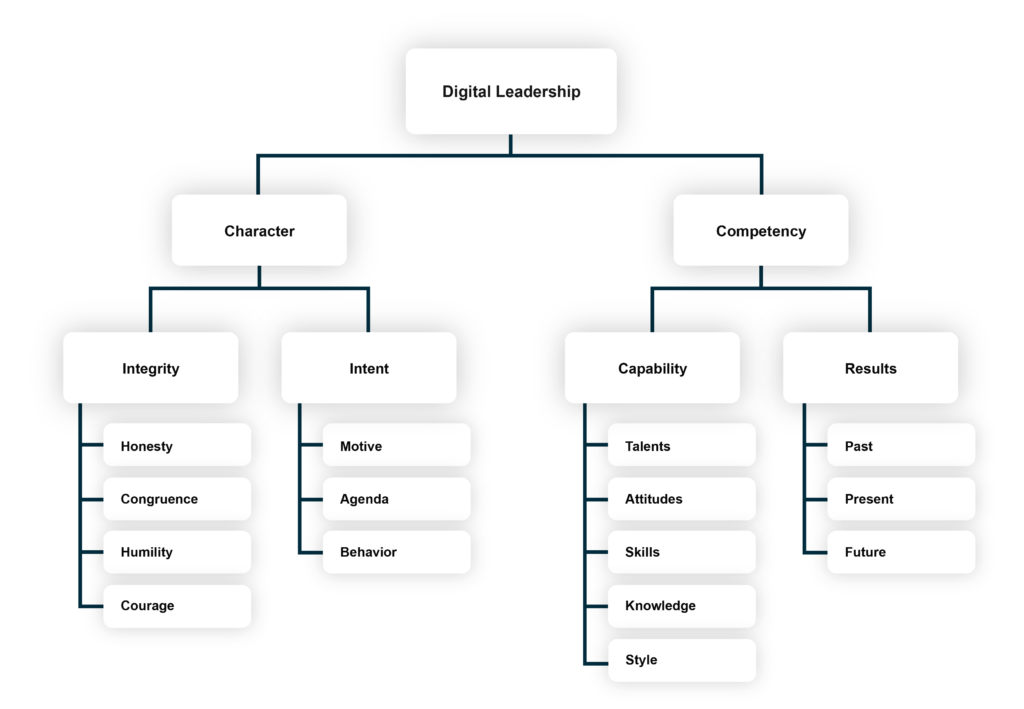Interview Guide
The basis for the interview instrument is Covey's Trust Model. We use elements of Covey's model, which shows all the subdivisions of the four core values as the framework for the interview guide. Our model and interview questions are shown below.

CHARACTER
INTEGRITY (Honesty, Humility, Courage, and Congruence)
- (Honesty) How often do you publicly address employees’ concerns with the strategy? Do you insist that employees be transparent and “talk straight” as well?
- (Humility) How open are you to new ideas? What do you do when your employees come to you with ideas that may at first seem to be crazy, off-the-wall notions?
- (Courage) Do you question the development paths you’ve set and take into account external, perhaps even controversial, perspectives?
- (Courage) Can you give us an example of when you were willing to change your plans when these ideas proved beneficial? Do you give teams the time and resources to experiment with these new ideas?
- (Congruence) Do you make decisions on intuition/experience or by utilizing facts and data analytics? Do you trust the data you are getting? What are the challenges?
INTENT (Motive, Behavior, and Agenda)
- (Agenda) What is your digital strategy? What is your vision for the company? How does the digital strategy fit into the company vision and overall business strategy?
- (Behavior) How do you communicate your digital strategy to employees, suppliers, and customers? Did you do this personally or delegate it to your staff or the marketing department? Do you insist that your staff “communicate, communicate, and communicate?”
- (Behavior) How did you (re)allocate resources to achieve the digital strategy? What specific investments did you authorize? Have you hired a Chief Digital Officer, formed partnerships with external organizations to help deliver the new strategy, launched a major acquisition and/or training program for data analysts, etc.? How much of your personal calendar is devoted to managing the transformation?
- (Motive) Based on your judgement, do employees find the strategy exciting and believe it represents a real—and necessary—change to the current business? Can employees see themselves operating in this new model? How do you encourage their buy-in?
COMPETENCY
CAPABILITIES (Talents, Skills, Attitudes, Knowledge, and Style)
- (Talents) What digital talents do you look for in your leadership team? Not all leaders are knowledgeable in digital transformation, much less the information technologies that enable it. What is your recommendation on how to bridge this gap?
- (Skills) What is your approach to hiring digital rock stars? “Digital natives” in specific departments may be necessary. Please describe how your organization recruits, hires, and retains people having these still rare skills.
- (Knowledge) List the major technologies that underpin your digital strategy, e.g. Artificial Intelligence (AI), IoT, business process automation, blockchain, etc. Are you fully committed to the cloud? Have you gotten push-back from the IT organization? How did you handle this?
- (Knowledge) Has your company institutionalized AGILE software development methods? To what extent are you leveraging AGILE, DevOps, and the cloud in your organization? What are the critical success factors on the way from traditional to AGILE project management?
- (Attitudes) How easy is it to share the lessons learned across the organization? How do you enable and promote knowledge sharing? How keen is your company to learn from others? Does your company have “safety nets” to foster a culture of experimentation that embraces failure as an opportunity for learning?
- (Style) Do you roll up your sleeves and work with the teams? How do you celebrate small successes and motivate employees?
RESULTS (Past, Present, Future)
- (Past) What accomplishments do you believe led you to obtain your current position?
- (Present) Thanks in large part to your leadership, we view your organization as a digitally mature organization. What recommendations would you give leaders of (less mature) digitally developing companies?
- (Present) Digital transformation is hard because it is difficult to align the organization behind it. Moreover, as we have discussed, often the culture is not ready to embrace it. What advice would you give to someone in the midst of a digital transformation to address the people’s fear of change?
- (Future) What do you see as the next phase of digital transformation? How are you preparing your organization for what must seem to be almost continuous change?
Final Question
20. In your mind, do the four principles of integrity, intent, capability, and results capture the essential elements of digital leadership, or is there a fifth principle that we have overlooked?